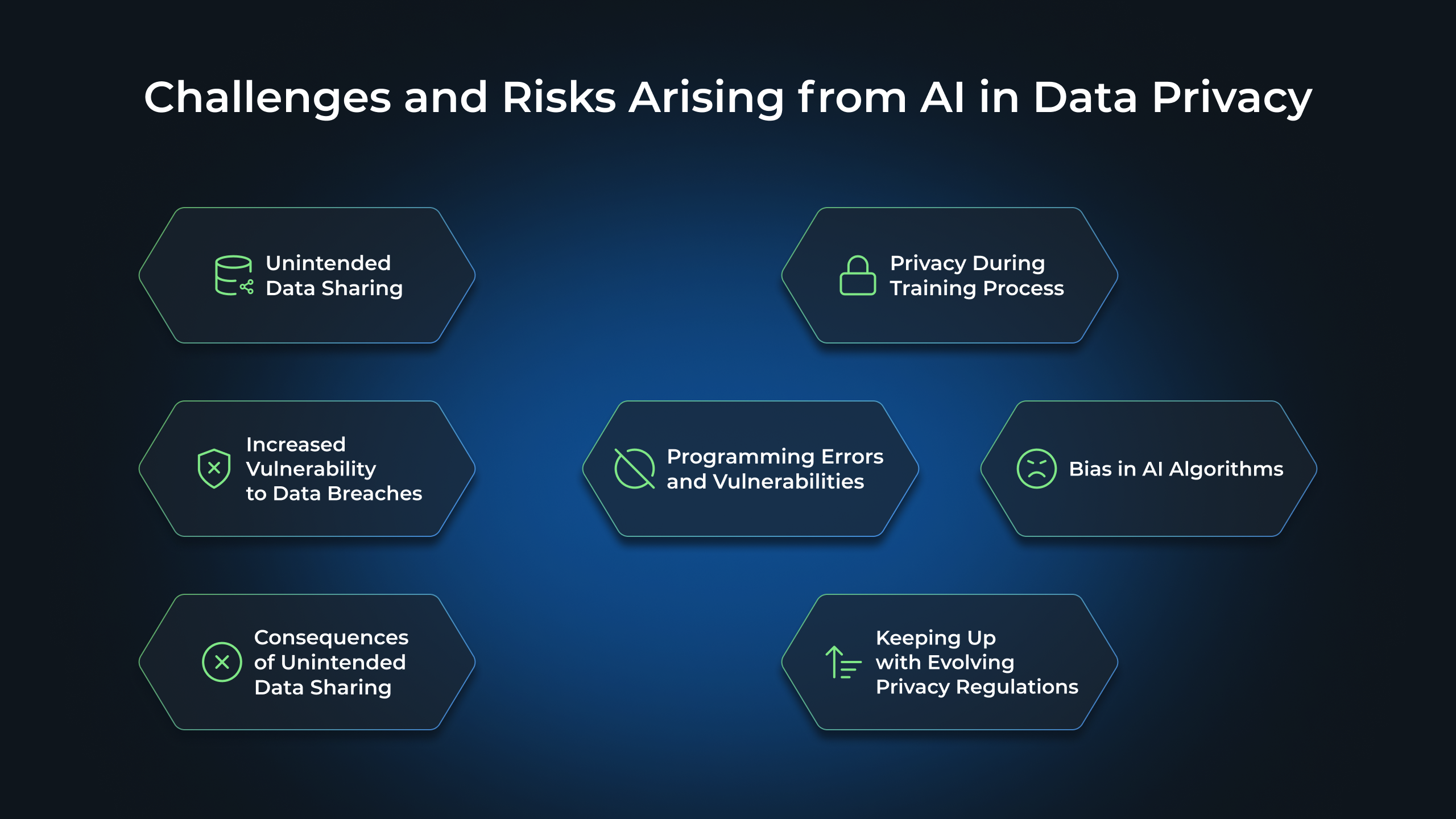We at WeSoftYou understand the importance of data privacy in today’s digital age, especially with the rapid advancements in artificial intelligence (AI). As a software development company with a proven track record in building secure and innovative solutions, we have witnessed the intersecting challenges of AI and data privacy.
Artificial intelligence (AI) encompasses a spectrum of technologies, including machine learning, natural language processing, and computer vision, allowing systems to process extensive datasets and derive patterns for informed decision-making. Machine learning, as a subset of AI, involves training algorithms on vast datasets to recognize patterns and make precise predictions. Meanwhile, natural language processing facilitates machines in understanding and interpreting human language, and computer vision enables the analysis and interpretation of visual data.
On the other front, data privacy focuses on safeguarding individuals’ personal information, covering names, addresses, financial details, and sensitive data. Compliance with data privacy regulations is paramount for protecting individuals’ rights and maintaining trust. Personal data is classified into personally identifiable information (PII) and non-personally identifiable information (non-PII). PII includes data that can directly or indirectly identify an individual, such as names, social security numbers, or email addresses. Conversely, non-PII encompasses data like demographic information or aggregated data, which doesn’t identify individuals.
In the realm of AI’s role in data collection and processing, it plays a pivotal part in analyzing vast amounts of data, potentially including personal information, to identify patterns and enhance the accuracy and efficiency of AI systems. The proliferation of digital technologies results in an unprecedented data explosion, providing AI systems with abundant information for learning and generating insights. For instance, AI algorithms can analyze customer behavior data to predict preferences or recommend personalized products and services.
However, the increasing reliance on data collection raises concerns about potential privacy violations. Despite AI’s numerous benefits, privacy risks emerge when sensitive information is mishandled or shared without proper consent. Therefore, organizations must implement robust data protection measures, including encryption techniques for securing data at rest and in transit, access controls to limit data access, and regular audits to detect unauthorized activities.
Additionally, organizations should adopt privacy by design principles, integrating privacy considerations into the design and development of AI systems. This involves implementing privacy-enhancing technologies, conducting privacy impact assessments, and providing transparent information to individuals about how their data will be used. Clear policies and procedures for data handling, coupled with employee training on data privacy and security, are essential for fostering a culture of privacy awareness and responsibility within organizations.
In conclusion, while AI holds the potential to revolutionize industries and improve lives, addressing the intersection of AI and data privacy is crucial. By implementing robust data protection measures, adopting privacy by design principles, and cultivating a culture of privacy awareness, organizations can effectively harness the power of AI while ensuring the protection of individuals’ personal information.
The Risks and Challenges of AI in Data Privacy

Data Sharing and AI
One of the risks associated with AI in data privacy is the unintended sharing of sensitive information. AI systems may inadvertently expose personal data due to programming errors, inadequate data anonymization, or inappropriate data sharing practices.
AI and Data Breaches
Another challenge lies in the increased vulnerability to data breaches. As AI systems rely heavily on vast amounts of data, they become attractive targets for cybercriminals. Breaches not only compromise individuals’ privacy but also undermine their trust in AI and the organizations leveraging these technologies.
Furthermore, the potential consequences of unintended data sharing are far-reaching. Imagine a scenario where an AI system designed to recommend personalized products based on user preferences inadvertently shares sensitive financial information with unauthorized third parties. This could lead to identity theft, financial fraud, and significant harm to individuals’ financial well-being.
In addition to unintended data sharing, AI systems also face the challenge of ensuring data privacy during the training process. Machine learning algorithms require large datasets to learn patterns and make accurate predictions. However, this reliance on data poses a risk as it can contain personal information that individuals may not want to be used for training AI models.
Moreover, the complexity of AI systems introduces the risk of programming errors that could compromise data privacy. Even with rigorous testing and quality assurance processes, there is always a possibility of bugs or vulnerabilities that could be exploited by malicious actors. These errors can lead to unintended data leakage or unauthorized access to sensitive information.
Another significant concern is the potential for bias in AI algorithms, which can have serious implications for data privacy. If AI systems are trained on biased datasets, they can perpetuate and amplify existing biases, leading to discriminatory outcomes. This not only violates individuals’ privacy but also infringes upon their rights and reinforces systemic inequalities.
Furthermore, the rapid advancement of AI technology poses challenges in keeping up with evolving privacy regulations. As AI systems become more sophisticated and capable of processing vast amounts of data, it becomes crucial to ensure that privacy laws and regulations are updated to address the unique risks and challenges posed by AI.
In conclusion, while AI holds great promise in various domains, it also presents significant risks and challenges in data privacy. Unintended data sharing, vulnerability to data breaches, training process privacy, programming errors, bias in algorithms, and evolving privacy regulations are just a few of the complex issues that need to be addressed to ensure the responsible and ethical use of AI while safeguarding individuals’ privacy.
Strategies for Securing Data Privacy
AI Ethics for Data Protection
As the demand for AI grows, it is vital to establish ethical guidelines and standards to ensure the responsible use of these technologies. Ethical considerations should encompass privacy-by-design principles, transparency in data collection and processing, and accountability for AI algorithms’ actions.
One of the key aspects of implementing AI ethics for data protection is the concept of privacy-by-design. This principle emphasizes the integration of privacy measures into the design and development of AI systems from the very beginning. By considering privacy as an essential component of the system’s architecture, organizations can proactively address potential privacy risks and protect individuals’ data.
Transparency in data collection and processing is another crucial element of AI ethics. Organizations should provide clear and understandable information to individuals about how their data is being collected, used, and shared. This transparency empowers individuals to make informed decisions about their data and ensures that organizations are held accountable for their data practices.
Accountability for AI algorithms’ actions is also a fundamental aspect of AI ethics. Organizations should take responsibility for the outcomes and impacts of their AI systems. This includes regularly monitoring and auditing the algorithms to identify and mitigate any biases or discriminatory practices. By promoting accountability, organizations can build trust with individuals and demonstrate their commitment to data privacy.
Data Anonymization in AI
Data anonymization is an essential practice in ensuring privacy in AI systems. By removing or encrypting personally identifiable information, organizations can minimize the risk of re-identification and protect individuals’ identities.
When implementing data anonymization techniques, organizations should consider various methods such as generalization, suppression, and encryption. Generalization involves replacing specific identifiers with more general categories to prevent the identification of individuals. Suppression, on the other hand, involves removing certain attributes or data points that could potentially lead to re-identification. Encryption is another effective technique where data is transformed into a coded format that can only be deciphered with the appropriate decryption key.
While data anonymization is crucial, it is important to note that complete anonymization is often challenging to achieve. With the advancement of AI and machine learning techniques, there is always a possibility of re-identification through data linkage or inference attacks. Therefore, organizations should regularly reassess and update their anonymization methods to stay ahead of potential privacy breaches.
In addition to protecting individuals’ identities, data anonymization also enables organizations to share data more securely for research and analysis purposes. By anonymizing sensitive information, organizations can contribute to the advancement of AI technologies without compromising privacy.
Regulatory Measures for AI and Data Privacy
Impact of Global Data Privacy Regulations on AI
Data privacy regulations, such as the European Union’s General Data Protection Regulation (GDPR) and California Consumer Privacy Act (CCPA), have significant implications for AI applications. These regulations aim to safeguard individuals’ privacy rights and ensure that their personal data is handled responsibly.
The GDPR, which came into effect in May 2018, applies to organizations that process the personal data of individuals within the EU. It requires organizations to obtain explicit consent from individuals before collecting and processing their data. Additionally, organizations must provide individuals with the right to access, rectify, and erase their personal data. The GDPR also imposes strict security measures to protect personal information from unauthorized access or disclosure.
The CCPA, enacted in January 2020, is a comprehensive data privacy law that applies to businesses operating in California and handling the personal information of California residents. It grants consumers the right to know what personal information is being collected about them and how it is being used. The CCPA also provides consumers with the right to opt-out of the sale of their personal information and imposes obligations on businesses to safeguard consumer data.
Compliance and AI
Organizations leveraging AI must keep abreast of evolving legal requirements and proactively adopt measures to ensure compliance. This includes establishing data protection policies that outline how personal data will be collected, processed, and stored. These policies should align with the principles set forth in data privacy regulations and reflect the organization’s commitment to protecting individuals’ privacy rights.
Obtaining informed consent is a crucial aspect of compliance with data privacy regulations. Organizations must clearly communicate to individuals the purpose for which their data will be used and seek their explicit consent before collecting and processing their personal information. This ensures transparency and empowers individuals to make informed decisions about the use of their data.
Implementing robust security measures is essential to protect personal information from unauthorized access, disclosure, or misuse. Organizations should employ encryption techniques, access controls, and regular security audits to safeguard sensitive data. By taking these measures, organizations can mitigate the risk of data breaches and demonstrate their commitment to data privacy.
In conclusion, the regulatory measures for AI and data privacy are crucial in ensuring the responsible and ethical use of personal data. Organizations must navigate these regulations to protect individuals’ privacy rights and maintain public trust in AI technologies. By proactively adopting compliance measures, organizations can leverage AI while upholding the highest standards of data privacy.
The Future of AI and Data Privacy
From our experience at WeSoftYou, we foresee a continued emphasis on data privacy and the integration of privacy-enhancing technologies in AI systems. This includes the development of decentralized AI architectures, federated learning approaches, and advances in differential privacy.
Decentralized AI Architectures
Decentralized AI architectures are set to revolutionize the way AI systems operate. By distributing the computational power across multiple nodes, these architectures ensure that data is not stored in a centralized location, reducing the risk of data breaches and unauthorized access. This approach also enhances privacy by allowing individuals to have more control over their personal data.
Federated Learning Approaches
Federated learning is another promising trend in the field of AI and data privacy. This approach enables AI models to be trained on decentralized data sources without the need to transfer the data to a central server. By keeping the data on local devices, federated learning protects sensitive information and minimizes the risk of data exposure. This technique is particularly useful in industries such as healthcare, where data privacy is of utmost importance.
Advances in Differential Privacy
Differential privacy is a mathematical framework that aims to protect individual privacy while allowing for meaningful data analysis. This technique adds noise to the data to prevent the identification of specific individuals. As AI systems become more sophisticated, advances in differential privacy will play a crucial role in ensuring that sensitive information remains secure and private.
Balancing AI Innovation and Data Privacy
As organizations strive for AI innovation, it is crucial to strike a balance between technological advancements and safeguarding individuals’ privacy. Responsible AI development practices, comprehensive risk assessments, and continuous monitoring are paramount in this pursuit.
Responsible AI Development Practices
Responsible AI development practices involve incorporating ethical considerations into the design and implementation of AI systems. This includes ensuring transparency in AI algorithms, avoiding bias in data collection and model training, and providing clear guidelines on data usage and storage. By adopting responsible practices, organizations can mitigate privacy risks and build trust with their users.
Comprehensive Risk Assessments
Conducting comprehensive risk assessments is essential to identify potential privacy vulnerabilities in AI systems. This involves evaluating the data sources, analyzing the potential impact of data breaches, and implementing appropriate security measures. By proactively addressing privacy risks, organizations can minimize the likelihood of data breaches and protect individuals’ sensitive information.
Continuous Monitoring
Continuous monitoring is crucial to ensure that AI systems remain compliant with privacy regulations and organizational policies. By regularly monitoring data access, usage, and storage practices, organizations can detect and address any privacy breaches or unauthorized access promptly. This proactive approach helps maintain data privacy and prevents potential harm to individuals.
Conclusion
In conclusion, securing data privacy in the age of AI poses numerous challenges but also presents significant opportunities. By understanding the intersections between AI and data privacy, implementing essential strategies, adhering to regulatory measures, and staying ahead of emerging trends, organizations can navigate this complex landscape and protect individuals’ privacy rights. At WeSoftYou, we are committed to assisting businesses in achieving their data privacy goals while harnessing the power of AI. Contact us today for a free consultation or project estimation.
FAQ
While AI has the potential to jeopardize data privacy, when implemented responsibly, it can enhance data protection measures and empower individuals with greater control over their personal information.
Artificial Intelligence (AI) has become an integral part of our lives, revolutionizing various industries and transforming the way we interact with technology. However, as AI continues to advance, concerns about data privacy have emerged. The vast amounts of data collected and processed by AI systems raise questions about how this data is used and protected.
When AI is implemented responsibly, it can actually enhance data privacy. By leveraging AI algorithms, organizations can strengthen their data protection measures, ensuring that personal information is securely stored and accessed only by authorized individuals. Additionally, AI can empower individuals by giving them greater control over their data, allowing them to make informed decisions about how their information is used.
Some of the main challenges include unintended data sharing, the threat of data breaches, and complying with global data privacy regulations.
Securing data privacy in the age of AI presents several challenges that organizations must address. One of the key challenges is unintended data sharing. With AI systems processing vast amounts of data, there is a risk of unintentional data leakage or sharing with unauthorized parties. Organizations need to implement robust security measures to ensure that data is protected throughout its lifecycle.
Data breaches are another significant concern. As AI systems become more sophisticated, so do the techniques used by malicious actors to exploit vulnerabilities. Organizations must continuously monitor and update their security protocols to stay one step ahead of potential threats.
Furthermore, complying with global data privacy regulations is essential. Different countries have different regulations regarding data privacy, and organizations operating globally must navigate these complex legal frameworks to ensure compliance. Failure to do so can result in severe penalties and damage to reputation.
WeSoftYou specializes in software development, and we can help businesses in implementing robust data privacy measures, AI ethics frameworks, and complying with relevant regulations.
At WeSoftYou, we understand the importance of data privacy in the age of AI. Our team of experts specializes in software development and can assist businesses in securing their data privacy. We work closely with organizations to develop and implement robust data privacy measures tailored to their specific needs.
In addition to data privacy measures, we also focus on AI ethics frameworks. We believe that responsible AI development goes hand in hand with data privacy. By integrating ethical considerations into the design and implementation of AI systems, we help organizations ensure that their AI technologies are developed and used in a manner that respects privacy and promotes fairness.
Furthermore, our team stays up to date with the latest global data privacy regulations. We can guide businesses through the complex landscape of data privacy laws, helping them understand and comply with the relevant regulations in their operating jurisdictions. For a free consultation or project estimation, contact us now!






















